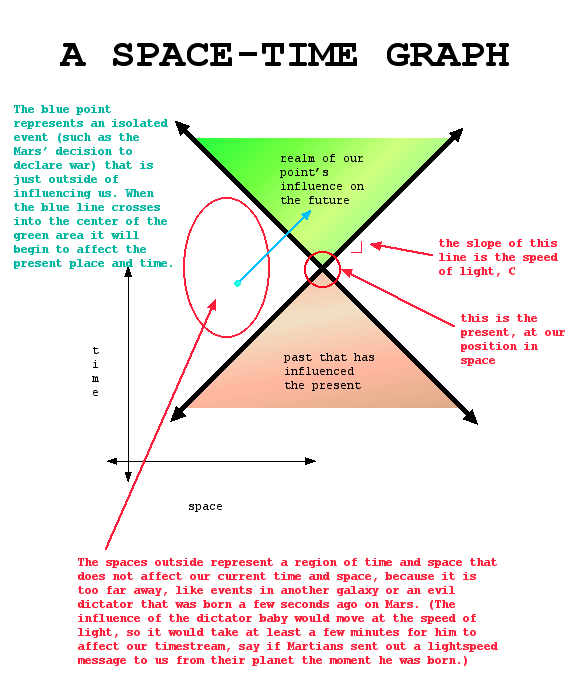AsterAzul wrote:Well, you can study relativity all you want, but to have it make intuitive sense to you is really, really hard.
Not if you're a real, real geek. It made sense to me from the start. I still don't understand all the math behind it though.
I'm posting again to point out that Aster's chart and description is accurate and insightful. Which sucks eggs, because it's far more appealing to me to poke fun at him. But, what can ya do? *sigh*
I went out to find Einstein's original thought experiment on relativity, and the first dozen sites are all pretty poor examples. It comes down to this:
Imagine you are chasing a beam of light, and that you are moving just as fast as it is. Then you would expect to see the light stable in front of you, with it neither retreating from you, nor you advancing on it. That's essentially the same as saying the light is not moving at all.
But, this is not what light does. It does move. And it moves at the speed of light away from you, no matter the reference. So, if you're standing still, light moves away from you at the speed of light. And if you're moving at the speed of light, light will move away from you at the speed of light. BUT, if you're standing still and watching someone chase a beam of light at the speed of light, they will appear to chase each other, the gap not growing or diminishing.
Now, Aster's graph shows another feature - that nothing, even (or especially!) information, moves faster than light.
This means that the Sun is several minutes away from us, at the speed of light. If the sun were to suddenly vanish, there is a several minute "queue" of light, headed our direction. Without the sun, there'd be no gravity there either - and gravity propogates at the speed of light. So, there's a several minute "queue" of gravity on it's way towards us. If the sun were to vanish, we'd first know when our closest sattelite recorded the event. Removing the sun does not remove it's presence from the entire universe instantly, but rather at the speed of light.
Which if you think about it makes sense. Ever watch the space shuttle take off? You see it take off and start to rise, and THEN you hear the roar. Light travels faster than sound. So, that doesn't mean there wasn't sound... just that the sound hadn't reached you yet. Light doesn't move instantly, but instead at a tremendously high (but not infinite) rate of speed. So just as sound takes time to get to you, so does light. Ditto lightning - you see the lightning, then feel the thunder.
Since no information can travel faster than the speed of light, no knowledge of an event can travel faster than light. Thus, if Mars decides to attack us, it will take minutes for the knowledge of their ships departure to reach us.. Or to put it another way, when we see their ships launch, they will have ALREADY launched.
... now, quantum entanglement is cool stuff... apparently some things do travel faster than light - such as the change in spin of a particle when the particle's entangled twin has it's spin changed. Currently we haven't been able to transmit data though this means, although up to five particles have been entangled in the lab... if they get to eight, they could do seven bits and a partity bit... but that's something else entirely.












